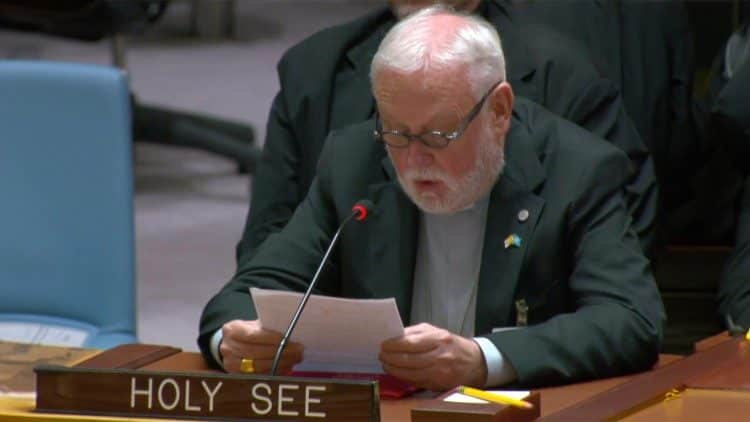At yesterday’s high-level meeting on pandemic prevention, preparedness, and response, Bishop Gallagher emphasized that health emergencies, like war, remind us of our fragility and deep interdependence, as well as our responsibility to each other. He urged promoting global solidarity and prioritizing universal access to health technologies, especially for the most vulnerable.
We publish below the speech that H.E. Archbishop Paul Richard Gallagher, Secretary for Relations with States and International Organizations of the Secretariat of State, delivered yesterday in New York at the High-Level Meeting on Pandemic Prevention, Preparedness and Response:
Speech by H.E. Archbishop Paul Richard Gallagher
Statement by H.E. Archbishop Paul Richard Gallagher,
Secretary for Relations with States and International Organizations of the Holy See, at the High-level Meeting on Pandemic Prevention, Preparedness and Response
20 September 2023
Mr. President,
The experience of the COVID-19 pandemic reminded all of us, once again, of our frailty, of our fundamental interconnectedness and dependence on each other, as well as of our responsibility towards the others. Indeed, as Pope Francis recalled “a healthy society is one that takes care of everyone’s health.”[1]
During the pandemic, we witnessed much good will and dedication, at all levels of Government and spheres of society. This is also true of the effort to swiftly develop, produce, and distribute, diagnostics, therapeutics, and vaccines for COVID-19. Yet, it remains concerning that the percentage of people in low-income Countries who have received at least one dose of a COVID-19 vaccine is about half of the rate in high-income Countries.[2] Putting global solidarity into practice requires prioritizing universal access to health technologies, particularly for the most vulnerable.
During the pandemic, limited production capacity, combined with vast differences in purchasing power, created disparities in access, which generosity alone could not overcome. Resolving this for future pandemics requires a developmental approach, reflecting the deep links between poverty and poor health. It also requires capacity building in developing countries to promote local research, innovation, production, and distribution. Beyond a “quick fix”, it is necessary to ensure that an equitable response may be given in future pandemics. Considering that durable solutions often take longer to achieve, we have no time to waste.
Mr. President,
All trustworthy responses to health emergencies must respect human rights and fundamental freedoms, including freedom of opinion, and expression, freedom of conscience and freedom of religion or belief. They must include solidarity mechanisms aimed at helping countries to provide medicines and adequate health-care to their populations, while respecting their cultural sensibility and sovereignty. Moreover, the sharing of scientific information and know-how at international level is also critical. In this regard, it is worth repeating that international organizations such as the World Health Organization have a significant role to play in order to encourage and facilitate coordination and cooperation, but that this also requires constantly to build trust with and among the countries.
Mr. President,
As Pope Francis has stated, “the greatest lesson we learned from Covid-19 was the realization that we all need one another [… and] that none of us can be saved alone.”[3] Let us hope that this remains the conviction which drives this meeting, and that may inspire the work of the Intergovernmental Negotiating Body and of the Working Group on Amendments to the International Health Regulations in Geneva. We never emerge from a crisis unchanged; it is up to us to ensure that that change is for the better[4].
Thank you, Mr. President.
___________________
[1] Pope Francis, General Audience, 9 September 2020.
[2] UNDP, Global Dashboard for Vaccine Equity, https://data.undp.org/vaccine-equity/ (35.85% compared to 72.89%, as of 23 August 2023).
[3] Pope Francis, Message for the LVI World Day of Peace, 1 January 2023.
[4] Cf. Pope Francis, Address to the participants in the Plenary Assembly of the Pontifical Academy for Life, 27 September 2023.










